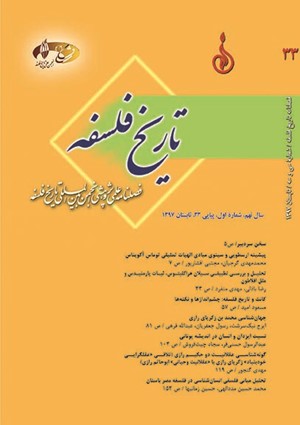نسبت ايزدان و انسان در انديشه يوناني
محورهای موضوعی : اندیشههای حکمی و فلسفی ایران باستان
عبدالرسول حسني فر
1
![]() ,
سجاد چيت فروش
2
,
سجاد چيت فروش
2
1 - دانشگاه سيستان و بلوچستان
2 - دانشگاه جامع امامحسين
کلید واژه: يونان هومر سقراط افلاطون خدا انسان ,
چکیده مقاله :
رفتار و کنش انسان در هر دوره بطور مستقيم متأثر از نگاه هستيشناسانه و مباني فکري و اعتقادي آن دوره ميباشد؛ به طوري كه براي فهم رفتار و کنش انسان و چرايي آن در يک دوره، بايد به شناخت مباني هستيشناسي و معرفتي آن دوره پرداخت. يکي از اين مباني هستيشناسانه و معرفتشناسانه که در فهم رفتار و کنش انسان در هر دوره ضروري مينمايد نوع نگاه به هستي و خداست که بطور مستقيم بر رفتار انسان در جامعه تأثير دارد. با توجه به ضرورت شناخت بين فرهنگي در دوره معاصر و تأثير و رابطه عميقي که بين يونانيان و ايرانيان وجود داشته است، شناخت مباني فکري و رفتاري يونانيان ميتواند در بررسي اين رابطه فرهنگي نقش کليدي داشته باشد. بر اين اساس، نوشتار حاضر در جهت شناخت مباني فکري و رفتاري يونانيان به بررسي نوع نگاه هستيشناسانه و مباني فکري آنها و بطور خاص نگاه يونانيان به خدا و نفس و تأثير اين نوع نگاه در رفتار و كنش انسان يوناني پرداخته است و بر اين مبنا سه انديشمند دوره يوناني يعني هومر، سقراط و افلاطون با روش تفسيري مورد بررسي قرار گرفته است. نتايج تحقيق نشان ميدهد نگاه يونانيان به خدا با تأثير انديشمندان هر دوره متفاوت بوده، بطوري که نگاه هومر، سقراط و افلاطون از جهتي از همديگر قابل تفکيک است. در نگاه اسطوره يي هومري، خدايان بسان قهرمانان بشري داراي صفات انساني و در معامله با انسان هستند، اما در نگاه سقراط، خدا موجودي است که بدنبال هدايت و راهنمايي انسانها بوده و از طريق دايمونها با مردم ارتباط دارد. در تفکر افلاطون که تکثر خدايان بسمت وحدت ميگرايد، خدا بعنوان ايده خير، موجودي متعالي است که سرنوشت و مبناي قانونگذاري در زندگي فردي و اجتماعي انسان قرار ميگيرد.
Man’s behaviors and acts in each period are directly influenced by the ontological views and philosophical and religious principles of that period. Therefore, in order to understand the nature of such behaviors and acts, one might initially learn about the dominant ontological and epistemological principles of the time. One of such principles which is necessary for understanding human behavior and acts in each period pertains to the prevailing view of being and God, which directly affects one’s conduct in society. Given the necessity of cross-cultural knowledge in the contemporary era, the profound relationship between the Greeks and Iranians, and its effects on different aspects of their thoughts, the knowledge of the Greeks’ philosophical and behavioral principles could play a key role in the study of this cultural relationship. Accordingly, the present paper investigates the ontological views of the Greeks, their philosophical principles and, particularly, their views of God and the soul and the effect of such views on their behaviors and acts. In doing so, the authors have examined the ideas of three thinkers of the Greek era, namely, Homer, Socrates, and Plato, following an interpretive method. The results of this study indicate that the Greeks’ view of God in each period changed under the influence of the views of the thinkers of the time. In fact, Homer, Socrates, and Plato held distinct ideas in this regard. In Homer’s mythical view, Gods are like human heroes with human attributes and in transaction with human beings. However, in Socrates’s eye, God is a being who guides human beings and communicates with them through demons. Finally, in Plato’s philosophy, where polytheism moves toward monotheism, God, as the Idea of Good, is a transcendent Being who determines Man’s destiny and promulgates laws for their individual and social lives.


